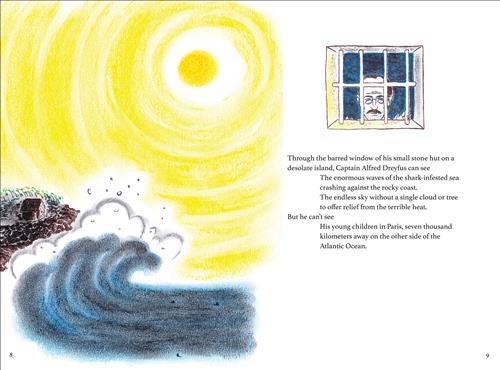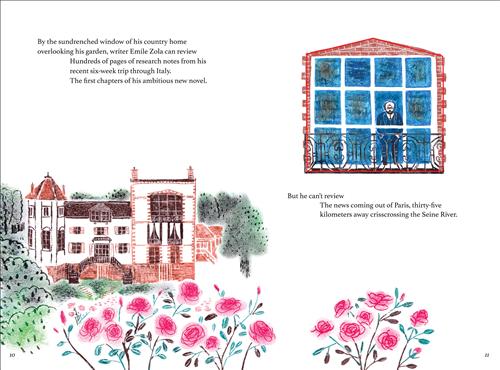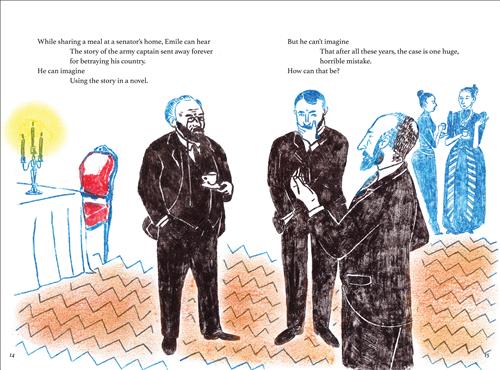Winner, Canadian Jewish Literary Awards Best Children's Book
When a Jewish army captain is falsely accused of treason and sent to prison, a writer uses his pen to fight for justice.
In 1895 a prisoner watches the ocean through the bars of his cell. Accused of betraying France, Captain Alfred Dreyfus is exiled to a prison on Devil’s Island, far from his wife and children. It’s a horrible fate — but what if he’s innocent?
Seven thousand miles away, the famous writer Emile Zola wonders: Is Alfred a traitor to France? Or a victim of antisemitism? Convinced that Alfred is innocent, Emile knows that it is his DUTY to help. He pens the famous letter “J’Accuse …!”, explaining that Alfred was blamed, charged, tried and convicted … only because he is Jewish.
This powerful middle-grade story written in verse with full-page illustrations is told from the perspectives of both Alfred Dreyfus and Emile Zola, two men whose courage changed the world. The true story of the Dreyfus Affair, published in time for the 125th anniversary of “J’Accuse …!”, acts as a reminder that a person committed to truth, justice and equality must stand up and speak out against prejudice for themselves — and for others. Includes an author’s note and further historical context.
Key Text Features
author's note
illustrations
sources
references
informational note
historical context
historical note
further information
afterword
headings
Correlates to the Common Core State Standards in English Language Arts:
CCSS.ELA-LITERACY.RL.4.3
Describe in depth a character, setting, or event in a story or drama, drawing on specific details in the text (e.g., a character's thoughts, words, or actions).
CCSS.ELA-LITERACY.RL.5.3
Compare and contrast two or more characters, settings, or events in a story or drama, drawing on specific details in the text (e.g., how characters interact).
CCSS.ELA-LITERACY.RL.5.7
Analyze how visual and multimedia elements contribute to the meaning, tone, or beauty of a text (e.g., graphic novel, multimedia presentation of fiction, folktale, myth, poem).
Winner, Canadian Jewish Literary Awards Best Children's Book
When a Jewish army captain is falsely accused of treason and sent to prison, a writer uses his pen to fight for justice.
In 1895 a prisoner watches the ocean through the bars of his cell. Accused of betraying France, Captain Alfred Dreyfus is exiled to a prison on Devil’s Island, far from his wife and children. It’s a horrible fate — but what if he’s innocent?
Seven thousand miles away, the famous writer Emile Zola wonders: Is Alfred a traitor to France? Or a victim of antisemitism? Convinced that Alfred is innocent, Emile knows that it is his DUTY to help. He pens the famous letter “J’Accuse …!”, explaining that Alfred was blamed, charged, tried and convicted … only because he is Jewish.
This powerful middle-grade story written in verse with full-page illustrations is told from the perspectives of both Alfred Dreyfus and Emile Zola, two men whose courage changed the world. The true story of the Dreyfus Affair, published in time for the 125th anniversary of “J’Accuse …!”, acts as a reminder that a person committed to truth, justice and equality must stand up and speak out against prejudice for themselves — and for others. Includes an author’s note and further historical context.
Key Text Features
author's note
illustrations
sources
references
informational note
historical context
historical note
further information
afterword
headings
Correlates to the Common Core State Standards in English Language Arts:
CCSS.ELA-LITERACY.RL.4.3
Describe in depth a character, setting, or event in a story or drama, drawing on specific details in the text (e.g., a character's thoughts, words, or actions).
CCSS.ELA-LITERACY.RL.5.3
Compare and contrast two or more characters, settings, or events in a story or drama, drawing on specific details in the text (e.g., how characters interact).
CCSS.ELA-LITERACY.RL.5.7
Analyze how visual and multimedia elements contribute to the meaning, tone, or beauty of a text (e.g., graphic novel, multimedia presentation of fiction, folktale, myth, poem).
| Published By | Groundwood Books Ltd — Oct 4, 2022 |
| Specifications | 64 pages | 6 in x 8.875 in |
| Keywords | prejudice; Jewish history; historical figure; propaganda; racism; justice system; politics; journalism; political science; feeling isolated; citizenship; respect for others; cultures and national identity; historical fiction; social justice; stories in verse; true story; |
|
Supporting Resources
(select item to download) |
Teacher's Guide |
| Written By |
HEATHER CAMLOT is the award-winning author of multiple books for young people, including the nonfiction The Prisoner and the Writer and the novels The Other Side and Clutch, the latter of which was named among Kirkus’s Best Middle-Grade Historical Fiction. A journalist for more than twenty years, she has written, edited and translated for Quill & Quire, Owl, TV Guide Canada and Style at Home, among others. Originally from Montreal, she lives in Toronto, Ontario, with her family. |
| Illustrated by |
SOPHIE CASSON illustrated The Prisoner and the Writer, written by Heather Camlot, winner of the Canadian Jewish Literary Awards Best Children’s Book. Her other books include The Artist and Me by Shane Peacock, a finalist for the Marilyn Baillie Picture Book Award, and Helen’s Birds by Sara Cassidy. Sophie’s work has also appeared in the Globe and Mail, the New York Times and Nature, as well as in the Canadian Museum for Human Rights. Sophie lives in Montreal, Quebec. |
| Written By |
|
HEATHER CAMLOT is the award-winning author of multiple books for young people, including the nonfiction The Prisoner and the Writer and the novels The Other Side and Clutch, the latter of which was named among Kirkus’s Best Middle-Grade Historical Fiction. A journalist for more than twenty years, she has written, edited and translated for Quill & Quire, Owl, TV Guide Canada and Style at Home, among others. Originally from Montreal, she lives in Toronto, Ontario, with her family. |
| Illustrated by |
|
SOPHIE CASSON illustrated The Prisoner and the Writer, written by Heather Camlot, winner of the Canadian Jewish Literary Awards Best Children’s Book. Her other books include The Artist and Me by Shane Peacock, a finalist for the Marilyn Baillie Picture Book Award, and Helen’s Birds by Sara Cassidy. Sophie’s work has also appeared in the Globe and Mail, the New York Times and Nature, as well as in the Canadian Museum for Human Rights. Sophie lives in Montreal, Quebec. |
| Audience | ages 9 to 12 / grades 4 to 7 |
| Reading Levels | Lexile 850L |
| Key Text Features | author’s note; illustrations; sources; references; informational note; historical context; historical note; further information; afterword; headings |
| Common Core |
CCSS.ELA-LITERACY.RL.5.7
CCSS.ELA-LITERACY.RL.4.3 CCSS.ELA-LITERACY.RL.5.3 |
Winner, Canadian Jewish Literary Awards Best Children's Book, 2023
Short-listed, David Booth Children's and Youth Poetry Award, 2024
Commended, Skipping Stones Book Awards, 2023
“The Prisoner and the Writer works as a story in itself, whether or not young readers understand the history; as a starting point for discussion; or, with its rich back matter, as a whetting of the appetite for high school and beyond.” — New York Times
“An affecting account of the Dreyfus Affair that highlights the importance of acting against injustices.” — Foreword, STARRED REVIEW
“Readers will see echoes of current events in this scandalous story of 1890s antisemitism, bias, and the role of upstanders in confronting prejudice. ” — Booklist
“Short, forceful verses from Camlot pair with textured portraiture and landscapes by Casson—oil pastel monoprints with soft pastel—to pull readers into this story based on France's Dreyfus affair.” — Publishers Weekly
“Beautifully illustrated and easy to understand, The Prisoner and the Writer caters to young readers who may be encountering this piece of history for the first time … Written in compelling verse, [it] opens up many themes for important educational discussion.” — Jewish Book Council
“A poetic and powerful presentation of the historic Dreyfus affair.” — Association of Jewish Libraries
“Beautifully illustrated, [The Prisoner and the Writer] is a vividly written parable for today's age of misinformation. The concept is carefully formed and powerfully executed … A delight and a uniquely valuable book for today's world.” — Historical Novels Review
“A soul-stirring story that is just as moving visually, The Prisoner and the Writer is well worth the read, and is a great introduction to developing young readers' critical thinking skills.” — Montreal Review of Books
The Prisoner and the Writer works as a story in itself, whether or not young readers understand the history; as a starting point for discussion; or, with its rich back matter, as a whetting of the appetite for high school and beyond.
A poetic and powerful presentation of the historic Dreyfus affair. … The text is both informative and evocative of struggle and emotion, and the illustrations, oil pastel monoprints, with added soft pastel, complement the text in their stark and melancholic tones.




